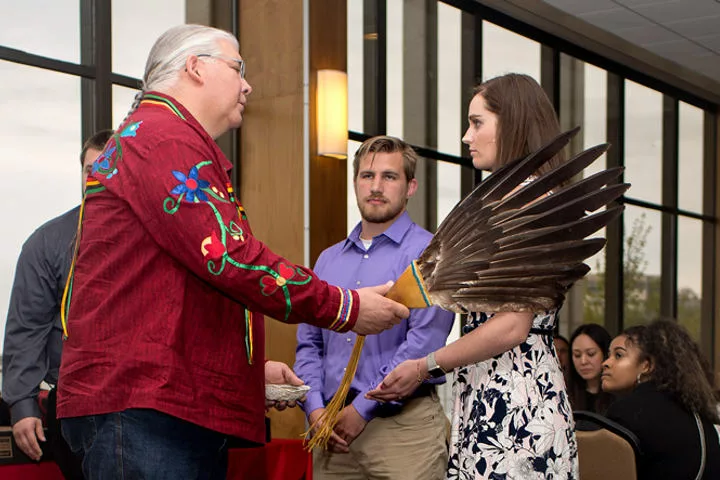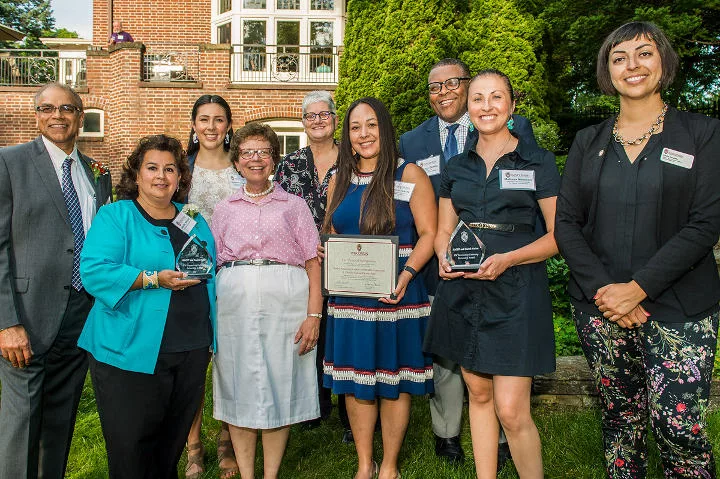Native American Center for Health Professions Focuses on Recruiting and Training People to Care for Native Populations
In October 2018, the American Association of Medical Colleges (AAMC) and Association of American Indian Physicians (AAIP) issued a sweeping report on the status of American Indian (AI) and Alaska Native (AN) representation among health care professionals. Despite a decades-long focus in academic medicine on increasing minority representation, the report’s statistics on AI and AN students applying to, entering and graduating from medical school showed a frustrating similarity to those of 30 or 40 years ago.
Efforts that produced modest success in the 1990s have seen their effects dwindle. Although the nation’s MD-granting institutions have, since 1980, increased the number of medical student slots available annually by about one-fifth, the percentage of Native students nationwide remained stuck in 2017-2018, at 0.20 percent for those reporting as either AI or AN alone, and at 0.76 percent for those reporting as AI and/or AN in combination with another race or ethnicity. AAIP President Ronald Shaw, MD, has called the findings “appalling and embarrassing.”

Yet the report was not all bad news. Some schools are bucking the trend, and among those achieving a consistent and encouraging impact is the University of Wisconsin School of Medicine and Public Health (SMPH), listed ninth nationwide in the percentage of AI-AN graduates from 1980 to 2017.
Since 2012, the SMPH’s effort to recruit, support and graduate Native American physicians has been fostered by its Native American Center for Health Professions (NACHP). The center’s mission is to enhance the recruitment, retention and graduation rates of Native American health professional students and to promote health education, research and community-academic partnerships with Native communities. In 2014, the program received a significant boost through a five-year Indians into Medicine (INMED) grant from the Indian Health Service. When the grant ends in fall 2019, NACHP will have a lot to show for its efforts.
Since NACHP’s inception in 2012, the SMPH has seen a 240 percent increase in the number of Native applicants. In the 2018-2019 academic year, NACHP has 15 Native students enrolled in the MD program, which is a 375 percent increase from Native student matriculants prior to NACHP’s establishment. In total, NACHP works with nearly 40 Native students in all the health professions programs combined on the UW–Madison campus. Thirteen students have graduated since the program’s inception, moving on to residencies throughout the United States in specialties from family medicine and pediatrics to orthopedics and emergency medicine. Some plan eventually to practice in tribal communities in rural underserved areas, while others will work in urban areas where the majority of Native people live.
According to NACHP Director Danielle Yancey, the strategies that are making a difference at the SMPH mirror the best practices outlined in the AAMC-AAIP report. These include outreach through local, regional and national student recruitment events; culturally responsive programs for enrichment and mentoring; student clinical experiences in tribal communities; involvement of an advisory council of Native health professionals; and opportunities for students to attend national conferences to network with other Native students and faculty members.

Yancey’s appointment as the center’s first full-time director in 2017 was a sign of NACHP’s growth. Raised on the Menominee Reservation near Green Bay, Wisconsin, and with experience working with tribal communities throughout the state in previous roles, she hit the ground running. In her first year as the director, on behalf of NACHP, Yancey was on the Madison Magazine “M List for Health Innovation.” That same year, she helped launch the NACHP Distinguished Lecture Series, as part of the INMED grant, which hosts Native American health professionals for presentations in Madison and in tribal communities. In December 2018, for example, the series featured Blythe Winchester, MD, a geriatrician who practices at Cherokee Indian Hospital in North Carolina. Her presentation, “Navigating the Health of Our Elders,” was held in two parts, with the first at the SMPH and the second in the Oneida tribal community in northern Wisconsin.
Yancey also coordinated NACHP’s highly anticipated move to a new location — shared with the Office of Multicultural Affairs — on the first floor of the Health Sciences Learning Center (HSLC). The choice new space, which is part of several enhancements to the HSLC completed in early 2018, “offers greater prominence and accessibility for students and visitors,” she says.
NACHP’s success is a testament to the efforts of the entire team, as well as past leaders who helped shape the mission and vision; they include Erik Brodt, MD, founding former director, Jacquelynn Arbuckle, MD ’95, former director, and Christine Athmann, MD, former assistant director. Today’s NACHP team, in addition to Yancey, includes Lauren Cornelius, Lina Martin and Melissa Metoxen. Cornelius is a program specialist who assists with the implementation of INMED grant activities, student recruitment and advising. A UW–Madison graduate, she is an enrolled member of the Oneida Nation. Martin, a program coordinator, works with pre-college and undergraduate pre-health students in partnership with UW–Madison’s Division of Diversity, Equity and Educational Achievement. Also a UW–Madison alumna, she is a member of the Ho-Chunk Nation and a descendent of the Stockbridge-Munsee community. And Metoxen — who has been with NACHP since its inception — is the community and academic support coordinator. An Oneida tribal member, Metoxen is based primarily at an in-kind NACHP office in the Oneida Community Health Center, and the proximity helps her maintain relationships with tribal communities and coordinate tribal clinic rotations and a variety of cultural experiences for Native American medical students. In October 2018, she was honored with the UW–Madison Outstanding Women of Color Award for her multifaceted work with NACHP.
Third-year medical student Jennifer Meylor, who hails from Northern California, cites NACHP as a significant factor in her decision to attend the SMPH. She learned about the center through an article about recruiting Native American students.
“I saw that in this program, Native American students were supported and thriving, and I wanted to get involved,” she says. “In my first year, NACHP hosted family dinners where I was able to meet other Native American students and start to form a community. I’ve been very close with these students and relied on them many times.”
NACHP has funded Meylor’s attendance at the annual AAIP conference to meet Native American physicians from around the country, and at conferences of a national student organization, Association of Native American Medical Students (ANAMS), for which she serves on its board.
“NACHP faculty have gone out of their way to support my involvement in this organization. In fact, this year NACHP has five students who are elected board members of ANAMS,” notes Meylor.
“Networking and mentorships with other Native physicians are so valuable,” adds Metoxen. “They help support students while they’re in medical school and help them obtain residencies where there are Native providers.”

Second-year student Ninah Divine also describes NACHP as “a huge factor in deciding where to attend medical school.” Having left her hometown of Madison for undergraduate school, she has been happy to re-integrate into the community, especially with “people and systems in place to support my goals in medicine.”
Like Meylor, she has attended national conferences through NACHP and has participated in trips the program arranges to events in tribal communities. Examples are the Oneida Harvest and Husking Bee and a wild rice-harvesting trip to Lac du Flambeau.
“NACHP is a huge support,” Divine says. “My goals are different from those of my peers, and it’s hard to articulate them without a long history lesson. NACHP helps me to feel proud of my heritage and my motivation.”
Among the most significant experiences for many students is their tribal clinic rotation. Wisconsin has 11 federally recognized tribes, and each has a clinic. Divine participated in a summer externship at the Ho-Chunk House of Wellness in Baraboo.
About the experience, she says, “It helped remind me that as hard as medical school is, I can look forward to being in and serving communities that share my values. It re-energized me, and it was a reminder of why I’m pursuing medical school.”
And she looks forward to more tribal clinic rotations and appreciates NACHP’s role in coordinating the details and helping to ensure a positive experience for both students and tribal clinics.
Collaboration within the school is a priority for NACHP, which aims to enrich the experience of Native students and support the program’s goal that all SMPH students learn about the health needs of tribal communities and are prepared to provide culturally responsive care to Native people wherever they practice. These collaborations include efforts such as providing tours and workshops for students pursuing the Path of Distinction in Public Health, a four-year longitudinal experience that integrates public health into physicians’ careers. NACHP also coordinates with the SMPH’s Department of Family Medicine and Community Health, Acting Ambulatory Internship, Wisconsin Academy for Rural Medicine (WARM) and Training in Urban Medicine and Public Health (TRIUMPH) programs to arrange tribal clinic experiences in rural and urban areas for non-Native students who request them.
In addition, NACHP collaborates with SMPH faculty to facilitate opportunities to partner with tribal communities on research initiatives. In June 2018, a collaboration between the Oneida Nation and the Wisconsin Alzheimer’s Disease Research Center received a UW–Madison Community- University Partnership Award in a ceremony held at the home of Chancellor Rebecca Blank (see photo on previous page). NACHP also received the award for its partnership with the Oneida Nation.
Although knowledge is sparse about Alzheimer’s disease among Native Americans, available data suggest higher-than-average risk, especially for early onset of the disease. When the Oneida Nation Commission on Aging requested help, physicians and researchers from UW Health and the SMPH responded. They have attended community meetings to discuss warning signs, symptoms and support for caregivers. They also conduct screenings and offer information about community resources and services. In some cases, tribal members have traveled to Madison for memory screenings as part of Alzheimer’s disease research being conducted by Carey Gleason, PhD. A professor in the SMPH Department of Medicine, Gleason sees the partnership as a way to respond to the Oneida community’s needs while helping her team gather important data on the incidence and impact of Alzheimer’s disease and other dementias in a Native American community. She hopes that including the community in studies will help researchers develop prevention strategies that are effective for all populations. The project offers opportunities for student experiences, too. For instance, Meylor was involved in developing community-based educational materials for tribal members who had been recently diagnosed with dementia.
Based on her six years of experience with NACHP, Metoxen observes that Native American students come to the SMPH seeking a medical school experience that is supportive and has relevance to their background and culture.
“We have many strengths,” she says. “Dedicated staff, dedicated space, support from SMPH leaders, strong relationships with tribal communities and an active advisory council. And what drives our success as much as anything is our underlying vision. From the start, our goal was a holistic focus on what students need. We see our role as understanding why they’re here and how we can support them.”